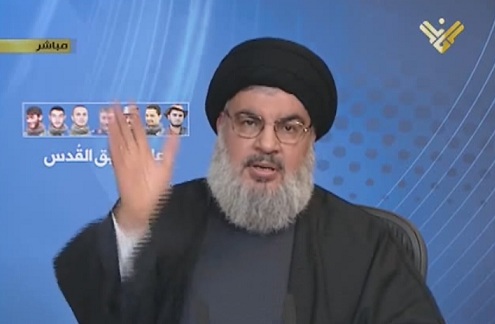 Hezbollah’s ambitions are spreading far beyond its Lebanon home as the militant Shiite movement appears increasingly bent on taking on Sunni foes across the Middle East. It has sent thousands of its fighters into Syria and senior military advisers to Iraq, helped Shiite rebels rise to power in Yemen and threatened Bahrain over its abuse of the Shiite majority.
Hezbollah’s ambitions are spreading far beyond its Lebanon home as the militant Shiite movement appears increasingly bent on taking on Sunni foes across the Middle East. It has sent thousands of its fighters into Syria and senior military advisers to Iraq, helped Shiite rebels rise to power in Yemen and threatened Bahrain over its abuse of the Shiite majority.
But the regional aspirations also are taking a heavy toll and threatening to undermine Hezbollah’s support at home. The group has suffered significant casualties, there is talk of becoming overstretched, and judging by the events of recent days, even a vague sense that the appetite for fighting the Israelis is waning.
In the recent confrontation, Israel struck first, purportedly destroying a Hezbollah unit near the front line of the Israeli-occupied Golan Heights. Among the seven dead on Jan. 18 were an Iranian general, a top Hezbollah commander and the son of another former commander in chief. A heavy Hezbollah retaliation appeared inevitable.
Yet when it came last Wednesday, Hezbollah’s revenge was relatively modest: two Israeli soldiers dead, seven wounded. The choice of location — a disputed piece of land excluded from a U.N. resolution that ended the 2006 war between Hezbollah and Israel — suggested to some that Hezbollah’s mind remains focused on more distant fronts.
The Hezbollah leader, Sheik Hassan Nasrallah, seemed to allude to criticism that Hezbollah’s taste for foreign adventurism is weakening its appetite for fighting Israel. In his speech Friday, Nasrallah said Israel had incorrectly thought that “Hezbollah is busy, confused, weak and drained. … The resistance is in full health, readiness, awareness, professionalism and courage.”
It is part of a complex equation for Hezbollah: On the one hand, many Lebanese resent the group for embroiling their vulnerable country in ruinous wars with Israel. But on the other, all shades of Muslim opinion see the Jewish state as a common enemy that Hezbollah forced, in 2000, to end an 18-year occupation in south Lebanon. In that sense even Sunnis, who along with Christians and Shiites make a third of the country’s population each, could see Hezbollah as a protector.
But that was then. Today, many increasingly look to Sunni-majority powers as Saudi Arabia, the United Arab Emirates and Egypt as their true backers.
“Increasingly, Hezbollah’s leadership perceives itself as a Shiite Arab regional actor, placing its commitment to the Palestinian cause on par with its mission as a defender of Shiite political and religious rights in the Arab region,” said Randa Slim, a director at the Washington-based Middle East Institute. “The consequence for Lebanon is that at some point the Shiite underpinnings of Hezbollah’s regional role will clash with the interests and demands of its non-Shiite, mainly Sunni compatriots.”

Hezbollah has room to grow as a leading defender of Shiites. But when Nasrallah has tried to make aggressive political proclamations, the results sometimes have backfired.
On Jan. 9, Nasrallah harshly criticized Bahrain over its crackdown on a Shiite-led uprising and its arrest of a leading Shiite cleric, Ali Salman. He compared Bahrain to his archenemy Israel, saying it was naturalizing foreigners to make the Persian Gulf island increasingly less Shiite.
Nasrallah then issued a veiled threat to Bahrain, although he said protests should remain peaceful. “Weapons can be sent to the most secure countries. Fighters and gunmen can enter and small groups can sabotage a country,” he said.
Hostile reaction swept the Arab world and Lebanon, where even some Shiites complained that threatening Bahrain could spur oil-rich Gulf nations to expel Lebanese Shiites from their soil. The six-nation Gulf Cooperation Council called Nasrallah’s comments “hostile and irresponsible.” The 22-nation Arab League accused him of meddling in Bahrain.
Hezbollah’s largest and most visible commitment is in Syria, where thousands of Hezbollah members are fighting alongside President Bashar Assad’s forces against predominantly Sunni rebels.
When Hezbollah first sent fighters to Syria in late 2012, Nasrallah said their role was to defend Shiite holy shrines near the capital, Damascus. Their role expanded to the defense of predominantly Shiite Lebanese residents of Syrian villages. The group now says its main reason to be in Syria is to prevent Sunni extremists from moving into Lebanon.
![Ibrahim al-Haj's son clings to his father's coffin. Haj was killed in a battle near Mosul, sources say [Al Jazeera]](https://yalibnan.com/wp-content/uploads/2014/08/hajs-son.jpg)
Hardly a week passes without Hezbollah’s Al-Manar TV airing funerals for fighters slain in Syria. Last year, a Hezbollah commander, Ibrahim Mohammed al-Haj, was killed while on a “jihadi mission” in Iraq.
Hezbollah positions in Lebanon also face repeated attacks mostly by an al-Qaida-linked group, the Nusra Front, based on the Syrian side of the border. Their wave of bombings since late 2013 have killed and wounded scores of people, and obliged Hezbollah to employ stiff security countermeasures, including the deployment of plainclothes Hezbollah members around the clock in Shiite business districts south of Beirut.
In Yemen, security officials say Hezbollah, which has long had a presence, has dispatched increasing number of cadres to the impoverished country since Shiite Houthis took over the capital, Sanaa, in September and later the airport.
The officials said before the takeover of the capital, Hezbollah had military and security advisers based in the Houthi’s stronghold of Saada province near the Saudi border, where the group’s leader, Abdul-Malik al-Houthi, is based.
Analyst Rami Khouri recently wrote in Lebanon’s Daily Star newspaper that all the adventurism has come at a political price.
“Hezbollah was widely acclaimed in much of Lebanon and the region for leading the battle to liberate south Lebanon from Israeli occupation,” he wrote. “Today, the very polarized Lebanese see the party either as the nation’s savior and protector — or as a dangerous Iranian Trojan horse.”
Washington Post

Leave a Reply
You must be logged in to post a comment.